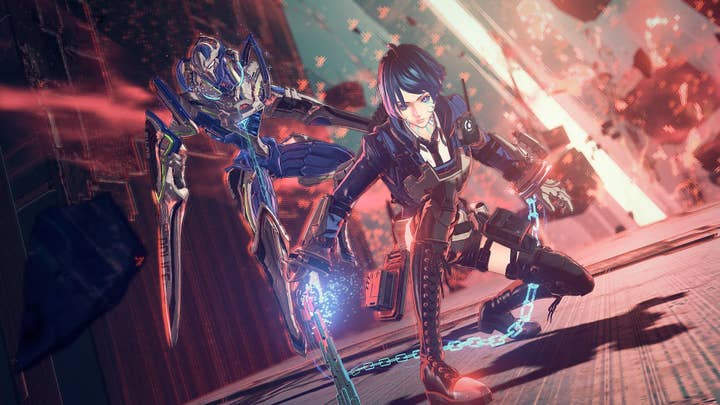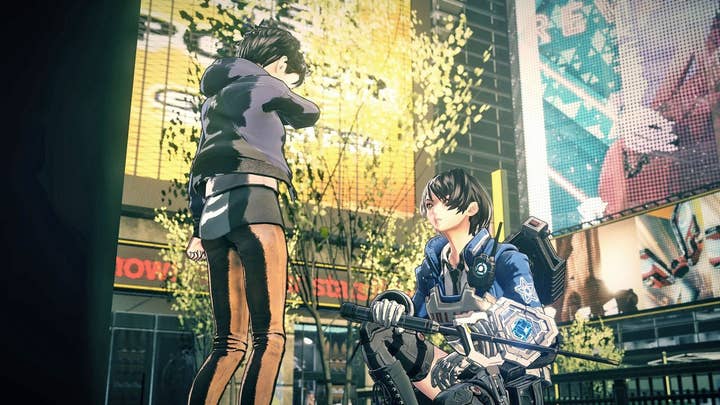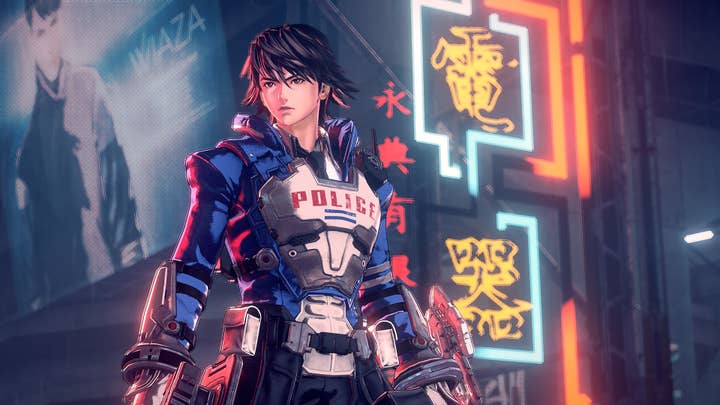Astral Chain: Critical Consensus
Platinum Games' first major release since Nier: Automata is hailed alongside that game and Bayonetta by the critics
In the two-and-a-half years leading up to the launch of Nier: Automata, Platinum Games worked on six titles that were released on at least one console platform. In the two-and-a-half years since the launch of Nier: Automata, Platinum worked on zero titles that were released on at least one console platform.
The launch of Nier was a pivotal moment for the studio, then, not only because it was successful, but because it hit the market in February 2017, one month after Microsoft cancelled its highly anticipated Xbox exclusive Scalebound. Platinum's management attributed the studio's survival to the money, attention and fans that Nier attracted, and every time the company has spoken on the record since then, it has described a future in which it would focus on creating its own IP and, ideally, publish its own work.
Astral Chain is part of that future, and also a nod to its past. The game's director, Takahisa Taura, was one of Nier: Automata's lead designers, widely recognised for corralling the wild, broad imagination of director Yoko Taro into a slick and rewarding action game. Astral Chain is the first game with Taura at the helm, and the Switch exclusive is one of the most highly praised titles in the Platinum's history.
"Ever wanted to try an action game like Bayonetta or Nier: Automata, but found the difficulty intimidating? Astral Chain is the answer"
Polygon
For Polygon's Chris Plante, one of Astral Chain's great achievements is the way it marries the "complexity and density" for which Platinum is known with "Nintendo's knack for accessibility."
"Astral Chain is an action game for beginners," Plante said. "The default difficulty mode favors story over challenge; the more difficult "Pt Standard" option, also available from the start, provides plenty of items to keep my character's health maxed and their powers buffed. Ever wanted to try an action game like Bayonetta or Nier: Automata, but found the difficulty intimidating? Astral Chain is the answer."
Key to this is an innovative combat system that pairs the protagonist -- a detective in a post-apocalyptic future under attack by chimeras from a separate realm -- with a "Legion," a tame chimera attached to you by a chain.
Plante added: "I don't have to memorise complicated combos that require precisely timed button inputs; my supercop delivers attacks with one button... The most intimidating move on paper -- controlling the two characters mid-combat to weaponize the chain that binds them together -- is surprisingly the most simple in action. It's like maneuvering two humanoid crafts in a twin-stick shooter.
"Which isn't to say that longtime action fans won't have enough to do. The game has depth -- just not at the expense of accessibility."

According to Game Informer's Andrew Reiner, the Legion is largely controlled by AI, with the Legion able to deal the "heaviest hits." The spectacle of watching an AI controlled partner dealing major damage to an enemy can "feel like cheating," Reiner said, a striking comment when placed next to Plante's praise of the accessibility that the exact same system affords. However, Reiner also noted the degree of "challenge and fun" that arises from duetting with your chimera companion.
"As you move your character into position for a sword combo with the left stick, you can rotate the Legion around an enemy to chain them in place, allowing both of your characters to pummel the hell out of it. If an enemy is about to charge you, you can again control the Legion manually to dash to the side to turn the chain into a trip-wire that again stuns the enemy. You can also tell the Legion when to execute its special attacks.
"I call out this structure because of how badly it impacts the game's pacing, and because poor pacing is among Astral Chain's worst sins"
Vice Waypoint
"This dual-character system works incredibly well, and is loaded with depth, especially when you unlock all five Legion, each designed to expand combat and exploration options."
USGamer was also full of praise for Astral Chain's dual-character combat, even despite the Joy-Con controllers that critic Julie Muncy said are "less-than-optimal" for this kind of action.
"When it flows it feels sublime in a way few combat systems do," Muncy wrote, but she also found weakness in the game's larger ambitions. Astral Chain has action at its core, but it's set in a world that offers plenty to keep an anime supercop busy.
"It's here, in these non-combat spaces, that Astral Chain feels considerably weaker. Investigating crimes as a cyberpunk police officer is cool but often mildly tedious, and the world doesn't have quite enough spark of a personality to make it pop. What's more, the complex control scheme, a comfortable necessity in high-speed combat, here just gets in the way.
"And it never feels good to be a police officer, especially when your interests veer away from the supernatural at any point. When you start using your Legion to, say, catch street thugs or arrest a graffiti artist in (thankfully brief and incidental) side quests, the game stops feeling like a bizarre cyberpunk riff on Digimon and becomes something altogether more sinister."
This complaint in an otherwise glowing appraisal is also at the heart of Astral Chain's most negative review from a major publication. Vice Waypoint's Austin Walker isn't entirely without compliments for Platinum's latest, but he laments a "structure and rhythm make it a slog." Every one of the game's 11 missions follows a similar three-stage pattern.

"After being briefed about a recent chimeric incursion, you explore your HQ, upgrading your equipment, completing some fetch quests, and trying to squeeze any bit of charm you can out of the game's mostly one dimensional supporting cast... Then you deploy to the scene of the crime, where you interview nearby witnesses, help the locals with some smaller cases (finding lost cats, arresting graffiti artists), scour the area for collectibles, and complete some minor combat challenges. Finally, the mission kicks off in earnest and you run through a gauntlet of arenas, traversal challenges, and spectacle-filled cutscenes on your way to a big boss encounter.
"It's a bit The Witcher, a bit Arkham Asylum and a bit Deus Ex, but it's always a Platinum game first and foremost"
Eurogamer
"I call out this structure because of how badly it impacts the game's pacing, and because poor pacing is among Astral Chain's worst sins. This is a game of constant stop-and-go, where supposedly high-tension chase scenes are slowed down by rote exploration puzzles and where the too-rare moments of high drama are immediately deflated by boring busy work, or, worse, paint-by-numbers boss fights."
In many of his criticisms, Walker is, if not alone, then certainly in a more remote neighbourhood of the critical community that has given -- at the time of writing -- Astral Chain a Metacritic rating of 87 after almost 60 reviews. In matters of taste there are no disputes, of course, but it's worth noting that some critics luxuriate in the self-same bus work that so riles others.
Kotaku's Mike Fahey, for instance, who found delight in such non-combat distractions as using the game's wardrobe to change into Astral Chain generous selection of new outfits. For Fahey, the "non-ass-kicking portions of the game" became central to its appeal, more so than "the combat that many assumed the game was all about."
"Astral Chain is more than a basic action game," he wrote. "The fighting and fiction are Astral Chain's skeleton, functional yet bony and pokey. Platinum Games has layered that sturdy frame with oodles of soft and squishy world-building, adventure-style investigative gameplay, and all sorts of optional mechanics allowing players to fiddle with fashion, take photos, or get to know their non-player allies better. It's a plush layer of padding that turns a serviceable action game into a fully-fleshed out action-adventure."
Astral Chain struck Eurogamer's Martin Robinson in much the same way; struck him so firmly and so true, in fact, that he awarded it a rare-as-hen's-teeth Essential rating. It is a skillful blend of many different genres that emerges as a singular experience, one that incorporates Platinum's knack for slick, focused combat but travels much, much further.
"It's all a bit Zelda," Robinson said, describing the expansive uses of the different Legions' abilities. "And it's also all a bit The Witcher, a bit Arkham Asylum and a bit Deus Ex, but it's always -- always -- a Platinum game first and foremost... It does make for a quieter, more plodding (and slightly lengthier) kind of experience than we've seen before from the studio... but when the action comes good god is it worth it."

